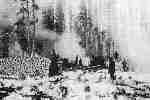
|
Internees piling pulp wood and burning brush, near Spirit Lake internment camp, Quebec, 1916 (Photo courtesy of Y. Luhovy) |
One of the strangest manifestations of our multicultural country is the emergence of lobby groups trying to get the federal government to pay cash to expiate the perceived sins perpetrated against their forebears. The success of the Japanese Canadian community in getting compensation for the treatment they received in World War II attests to two basic political realities.
The first is that timing is everything. For years the Japanese Canadians had been pushing for redress with little effect other than to generate a fair amount of public support. Pierre Trudeau was outspoken in his view that regrettable as the history might have been, we cannot rewrite it and the harm cannot be erased with money. The Conservatives felt otherwise and came through with payments, prodded no doubt by the fact that the Americans were doing the same thing.
The second reality is that actions create precedents. Since the government announced redress would be made to the Japanese community, there have been a spate of claims. A reading of the press will reveal that the Chinese are making a claim in respect of the infamous head tax, the Ukrainians are making a claim in respect of World War I internment, while other claims are being made by Sikhs, Italians and Germans.
It is worth adding that there is no unanimity within the ethnic groups as to whether such claims should be accepted. For example within the Ukrainian community academics have squared off as to the factual basis for the claim. The claim of the Italians for redress for those interned during World War II seems to be the brainchild of one Toronto lawyer. Even within the Japanese community there were those who opposed the concept on philosophical grounds.
But the most amazing thing of all is that Prime Minister Mulroney has indicated in speeches before ethnic groups that the Canadian government would give serious consideration to the claims and by consideration he implied that money would be paid to them.
Writing as one who had three grandparents emigrate to Canada, I know the country was in many ways a racist society in the 19th and early 20th century. But it was racist primarily when measured against today's norms. Nobody held a gun to the heads of our immigrant forebears and forced them to come to Canada. Indeed, most of them were grateful for the opportunity. And if life was hard and the community at large bigoted by the norms of today, that was something which could be accepted. Precious few returned to their homelands because of their treatment by Canada. It is their children and grandchildren who are claiming that redress must be made.
Governments are elected by people and the governments of the day had the same biases against immigrants and the same fears of them as did the populace at large. And when faced with crises such as war, they reacted in a primitive manner. Why should we bear the guilt and cost of what was considered normal behavior in its day?
If you doubt all this, cast your minds back to 1970, the invocation of the War Measures Act. National hysteria supported a government which in retrospect made a large number of wrong decisions. A lot of people ended up in jail for what we now perceive as no reason. The author of those actions was Pierre Trudeau, a man who is said to love reason over passion. But he must have seen first hand how passion overcame reason. Which might in part explain why he felt that public condemnation of the decisions of his predecessors was unfair and unwarranted.
I personally agree wholeheartedly with the idea that the sins of the past should be discussed and taught with a view to avoiding similar situations in the future. But the idea that we are somehow collectively guilty for decisions made by long-forgotten administrations and that current tax dollars must be paid to wash away our guilt is ludicrous. Those who demand money to assuage the mental pain they feel for sins perpetrated upon their ancestors leave me with a feeling of cynicism.
A lot of people have suffered in Canada and elsewhere because our society has not reached perfection. I believe the shortcomings of the past should be examined, particularly within the context of the times. History should not be glossed over, but examined warts and all. But the idea that we have to apologize and pay for historic depredations is stupid for there would be no end to it.
The prime minister should recognize that Japanese Canadian redress was, and should remain, a respectable anomaly, not a precedent for ethnic exploitation.
Contributing editor Arthur Drache is a lawyer with the Ottawa office of Fraser & Beatty.
![]() Return to Righting An Injustice Page
Return to Righting An Injustice Page
![]() Return to Internment of Ukrainians in Canada 1914-1920 Page
Return to Internment of Ukrainians in Canada 1914-1920 Page
![]() Return to Ukrainian History Page
Return to Ukrainian History Page
![]() Return to InfoUkes Home Page
Return to InfoUkes Home Page
Document URL: http://www.infoukes.com/history/internment/booklet02/doc-054.html
Copyright © 1994 Ukrainian Canadian Civil Liberties Association
Copyright © 1994 Lubomyr Luciuk
We acknowledge the help in the preparation of this document by Amanda Anderson
Page layout, design, integration, and maintenance by G.W. Kokodyniak and V. Pawlowsky
Copyright © 1996-1997 InfoUkes Inc.
E-mail: internment@infoukes.com
|
since Mar 1 1997 |
InfoUkes Inc. Suite 185, 3044 Bloor Street West Etobicoke, Ontario, Canada M8X 2Y8 Tel: (416) 236-4865 Fax: (416) 766-5704 |
Originally Composed: Tuesday December 3rd 1996.
Date last modified: Thursday October 30th 1997.